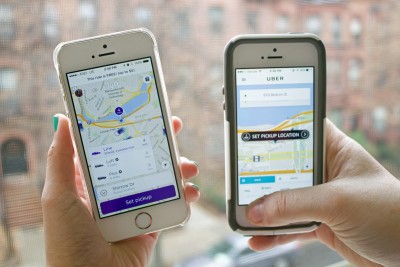
After extended controversy regarding limitations on transportation network companies such as Uber and Lyft, the Massachusetts House of Representatives engrossed a bill Wednesday to provide regulations for the ride-for-hire industry.
The bill will need to be passed through the Massachusetts Senate and signed by Massachusetts Gov. Charlie Baker before it becomes law. Elizabeth Guyton, spokesperson for Baker, expressed in a statement the governor’s excitement to review the bill.
“Governor Baker thanks the House for their progress on this bill and believes today’s passage is an important step towards protecting public safety while embracing innovation and economic growth,” Guyton wrote in the statement. “The Governor looks forward to working with the legislature as the process continues and will carefully review the final bill once it reaches his desk.”
The bill allows licensing authorities to view criminal records of all applicants, requires drivers to show decals indicating that they are TNC vehicles and prohibits TNC drivers from raising fares “during a state of emergency.”
Despite the recommendations of Boston Police Department Commissioner William Evans and nonprofit groups, the House version of the bill does not require TNC drivers to undergo a fingerprint background check. Commissioner Evans wrote in a statement that he was disappointed the fingerprinting requirement was not included.
“I am disappointed to learn that fingerprinting was not included in the bill, especially seeing how quick and simple the process has gone with Boston taxi drivers,” Evans wrote. “I will continue to push for the highest public safety standards.”
Evans has previously supported fingerprint background checks as an essential step for safer transportation in Boston. BPD began fingerprinting Boston’s taxicab drivers in February, The Daily Free Press reported Feb. 26.
The legislation has stirred up conflict between Boston’s TNCs and taxicab drivers. Chris Taylor, general manager for Uber Boston, wrote in a statement that the House version of the bill would stunt TNC growth.
“The current provisions adopted by the House today will stifle growth and innovation,” Taylor wrote. “We look forward to working with the Senate to help craft legislation which will allow ridesharing to continue in the commonwealth.”
Donna McColgan, a spokesperson for the Boston Taxi Drivers Association, said the legislation, if passed, would give TNCs an unfair advantage over taxi companies.
“There’s nothing in this legislation that levels the playing field for the Boston taxi driver or for the small owner-operators,” McColgan said. “We feel that it was really designed to allow Uber and Lyft to continue operating in the way they already are operating.”
McColgan added that while there is a limited number of taxi medallions, there is no limit to the number of TNC vehicles that can be in operation at once. McColgan said this gives TNCs an advantage that puts taxi companies in danger of bankruptcy.
“There should be caps on the number of Uber and Lyft vehicles that can be operating on any of the streets in Boston at any one time,” McColgan said. “Right now, we have an 8-1 ratio in vehicles to cabs. How do you compete?”
McColgan also said TNC fares should be regulated, even during regular, non-surge hours.
“There should be some regulations requiring fares to be regulated that are equal to a meter fare within the communities, and there’s none of that language in there,” McColgan said. “This is just a legislation that is going to continue to bleed out the taxi industry until there is no taxi industry.”
Several Boston residents expressed hope for TNCs to continue servicing the community.
Nate Wells, 27, of Back Bay, said he approves of the bill because TNCs are more useful and modern than the taxi industry.
“I get that the taxi industry is worried about going out of business, but I don’t see why they don’t just join Uber,” Wells said. “I honestly just don’t see the need for taxis anymore, since Uber is way more accessible and easy. They should just absorb the taxi drivers, in my opinion.”
Alicia Coulter, 28, of Back Bay, said it’s important for TNCs to establish rules to continue servicing the community.
“It’s good for them to have regulations,” she said. “All industries have rules, and I think rules for these companies have been hard to implement because it’s still kind of new, but it’s important to have these regulations.”
Christine Dyer, 37, of South Boston, said she feels it’s important to not limit TNCs to having the same regulations as taxis.
“I get why they need to have rules, but I really think Uber and Lyft need some degree of freedom,” she said. “I like them better than taxis, and I wouldn’t want them to be forced into becoming taxis.”
Kennedy serves as a city associate for the Daily Free Press. A freshman, she studies English with a minor in philosophy. As a journalist, Kennedy shows special interest in crime and local politics. You can follow her on Twitter at @stellarkenn.















UBER does not care about their drivers.UBER keeps adding more drivers, to the point we are making minimum wage or less some days when you calculate car expenses.The only way we make any money is by having personal car insurance. If new laws are enacted for criminal checks and proper insurance,this will get rid of the part time drivers and increase the number of fares available,allowing us to make a living wage.The best thing that could happen is that we become employees and get basic benefits.There is only so much of the pie to be split.
how dot think one industry will servive by doing all wrong just because it comes cheep on some one expense sorry I forget the pimps are servicing by exploiting others TNC way slavery will blossom too the difference is there is no chain and volenterly
The ONLY REASON the taxi industry is putting up a fust, is they can not compete on a level field. Their taxi drive around town, unaccountable. That is to say, no one is looking over their shoulder.